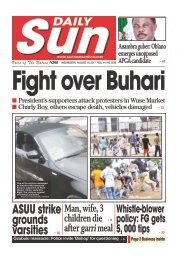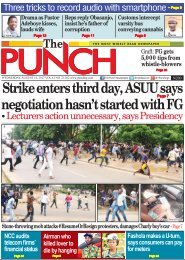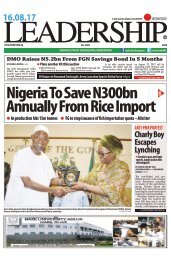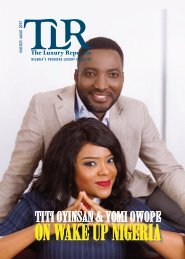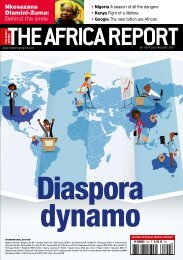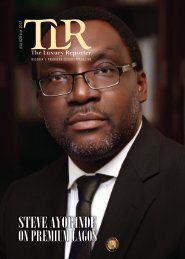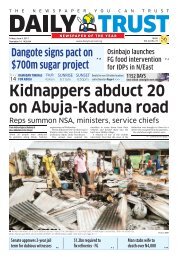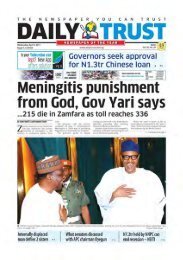Create successful ePaper yourself
Turn your PDF publications into a flip-book with our unique Google optimized e-Paper software.
INDEPENDENT WEDNESDAY, AUGUST 16, 2017 /<stro<strong>ng</strong>>Independent</stro<strong>ng</strong>><strong>ng</strong>r @independent<strong>ng</strong>r www.independent.<strong>ng</strong> D7<br />
Your Views<br />
Articles/Opinions should be a maximum<br />
of 750 words sent with the writer’s photograph<br />
to: opinion@independentnig.com<br />
CROSSWORD<br />
with<br />
AYODEJI Ajayi<br />
09084528388<br />
(sms only)<br />
ayodejideajayi@gmail.com<br />
I<br />
recall vividly with profound pride<br />
and nostalgia that as privileged undergraduate<br />
in the then prestigious<br />
Department of Mass Communication,<br />
University of Lagos, several years ago, I<br />
can say, unequivocally, that the Nigerian<br />
education sector had public universities<br />
that were truly centres of excellence, in<br />
terms of meani<strong>ng</strong>ful teachi<strong>ng</strong>, learni<strong>ng</strong>,<br />
research, as well as sustainable partnerships<br />
and relationship between universities<br />
and their immediate environments.<br />
In those days, reputable public<br />
universities especially, University of<br />
Ibadan, University of Lagos, University<br />
of Nigeria, Nsukka, and Ahmadu Bello<br />
University, Zaria, were not only centres<br />
of academic excellence, they were also<br />
passionately patronised by many eminent<br />
parents and guardians that wanted their<br />
children and wards to attend these frontline<br />
universities. Consequently, it was<br />
not surprisi<strong>ng</strong> that, unlike other public<br />
universities, this set of unique tertiary<br />
institutions attracted dedicated, hardworki<strong>ng</strong>,<br />
visionary, honest, intelligent,<br />
and detribalised Vice-Chancellors, Registrars<br />
and Bursars. The Vice-Chancellors<br />
were highly revered for dischargi<strong>ng</strong> their<br />
responsibilities with unquestionable<br />
CHUKWUDI OBI<br />
On The Senate, Ports And Revenue Leakages<br />
One is constrained to join issues<br />
with “Mr. Yahaya Sadique”, supposedly<br />
a Kaduna-based writer<br />
over an article authored by him<br />
and published recently in THISDAY. The<br />
article entitled “The Senate, Ports and<br />
revenue leakages” is, to say the least, a<br />
disservice to the cause of truth. Although<br />
it hi<strong>ng</strong>es its premise on the ports and attempts<br />
by the senate to investigate alleged<br />
revenue leakages at the ports, it dwells<br />
extensively on a statement recently issued<br />
by respected elder statesman and former<br />
Military Governor of Kaduna State, Col.<br />
Umar Abubakar Da<strong>ng</strong>iwa Umar (rtd).<br />
And that is really pathetic.<br />
One finds it distasteful that “Mr.<br />
Sadique” would disparage a man who<br />
has remained one of the most committed<br />
patriots and has never shied away from<br />
speaki<strong>ng</strong> his mind on national issue, no<br />
matter how contentious they are. To insinuate<br />
that the statesman is under the<br />
influence of the NPA, is to say the least, a<br />
disgraceful position not expected of anyone<br />
conversant with our national history<br />
and national interest at heart.<br />
But it does not seem that the writer under<br />
discussion is in tune with the current<br />
state of affairs goi<strong>ng</strong> by the content of his<br />
article, especially as it concerns the NPA.<br />
Anyone familiar with the current state of<br />
affairs at the NPA would readily testify<br />
to the increasi<strong>ng</strong> level of transparency<br />
at the agency.<br />
Just on Tuesday this week, a report in<br />
The Nation quoted a statesman and former<br />
Governor of Ogun State, Chief Olusegun<br />
Probe Of Vice-Chancellors<br />
integrity and this was attributed to the<br />
unflinchi<strong>ng</strong> support received from relevant<br />
stakeholders. But today, more than<br />
four decades after graduation, it saddens<br />
my troubled mind whenever I ruminate<br />
over the current decayi<strong>ng</strong> infrastructure,<br />
economic and financial rot, fast declini<strong>ng</strong><br />
quality of education, mass production of<br />
unemployable graduates, as well as unendi<strong>ng</strong><br />
moral decadence bedevilli<strong>ng</strong> virtually<br />
all public universities across the<br />
country. As it is in public hospitals, includi<strong>ng</strong><br />
university teachi<strong>ng</strong> hospitals, often<br />
described as mere consulti<strong>ng</strong> clinics, most<br />
of the public universities are not better<br />
than glorified secondary schools.<br />
It is unfortunate that rather than set<br />
up the number of universities they can<br />
successfully cater for and ensure they are<br />
adequately funded for uninterrupted academic<br />
calendars, as well as world-class<br />
academic standards in terms of teachi<strong>ng</strong>,<br />
learni<strong>ng</strong>, research and quality of graduates<br />
produced, in-line with global best practices,<br />
successive administrations, especially<br />
since the return of civil rule in 1999, have<br />
indiscriminately established new universities,<br />
some of which have not fully taken<br />
off, based on primordial reasons such as<br />
politics and geographical location.<br />
No wonder rather than serve as citadel<br />
of outstandi<strong>ng</strong> academic accomplishments,<br />
compared with their counterparts<br />
on the African continent or indeed, worldwide,<br />
none of Nigeria’s public universities<br />
meets global standards. This explains why,<br />
except private universities, virtually all<br />
those owned by federal and state governments<br />
are continuously gaspi<strong>ng</strong> for breath,<br />
largely due to inadequate fundi<strong>ng</strong>, mismanagement<br />
and unbridled corruption.<br />
It is disgusti<strong>ng</strong> that these days, unlike<br />
in the past, Vice-Chancellors, Registrars<br />
Osoba as sayi<strong>ng</strong> the followi<strong>ng</strong> about the<br />
new administration at the NPA. “If anybody<br />
is complaini<strong>ng</strong> about Hadiza Bala<br />
Usman…it must be that such people are<br />
not transparent. And if you are not transparent<br />
and compliant to the rules and regulation<br />
of NPA, you will run into troubled<br />
waters with Hadiza Bala Usman.”<br />
How does this differ from Umar comments<br />
made about her just a few hours<br />
before Osoba said the foregoi<strong>ng</strong>?<br />
It is unfortunate that it is this same person<br />
that Sadique is accusi<strong>ng</strong> of not just<br />
embarki<strong>ng</strong> on a media campaign against<br />
the Senate Committee on Customs, Excise<br />
&Tariffs and Marine Transport, but<br />
recruiti<strong>ng</strong> “supporters” in an imaginary<br />
media trial.<br />
From what I have read about the NPA<br />
in the past couple of months, its management<br />
has shown commendable commitment<br />
to instituti<strong>ng</strong> a culture of transparency<br />
at the organisation.<br />
Concerni<strong>ng</strong> their relationship with the<br />
Senate, the only public comments that can<br />
be attributed to the NPA are those which<br />
offered explanations on issues raised by<br />
the Senate committees and went on to assure<br />
of its readiness to provide further<br />
information. Two examples of these are<br />
statements entitled: “NPA welcomes Senate’s<br />
investigation of its JV Enterprises,”<br />
published in the July 7, 2017 edition of<br />
Leadership and “No evidence of 282 missi<strong>ng</strong><br />
vessels, says NPA,” published in the<br />
July 27, edition of THISDAY. From this, it<br />
is evident that the NPA does not need any<br />
mouthpiece to communicate its opinion<br />
to stakeholders in the Nigerian project.<br />
Havi<strong>ng</strong> said that, there is a need to<br />
and Bursars of public universities, constantly<br />
visit offices of Economic and<br />
Financial Crimes Commission (EFCC)<br />
for questioni<strong>ng</strong> over alleged financial irregularities.<br />
This is shameful; whereas<br />
Vice-Chancellors, bei<strong>ng</strong> Chief Executive<br />
Officers rather than corrupt political leaders,<br />
are expected to demonstrate sterli<strong>ng</strong><br />
leadership qualities for others to emulate.<br />
Public university Vice-Chancellors are not<br />
different from politicians because they are<br />
appointed either by the President in the<br />
case of federal universities or by governors<br />
for those owned by state governments.<br />
Since many of such appointments are not<br />
based on merit but political, religious or<br />
personal considerations, the Vice-Chancellors<br />
have no option but dance rhythmically<br />
to tunes of their benefactors, at the<br />
expense of the success and survival of the<br />
university system, which is currently in a<br />
big mess. Like the sickeni<strong>ng</strong> Nigerian polity,<br />
public universities have been polluted<br />
and require sweepi<strong>ng</strong> sanitisation for the<br />
entire university system to regain its lost<br />
glory. For years, accounts of many public<br />
universities have not been audited and this<br />
has given room for corruption.<br />
It is amazi<strong>ng</strong> that most of the reports of<br />
inquiry into financial irregularities involvi<strong>ng</strong><br />
some Vice-Chancellors, Registrars and<br />
Bursars are yet to be released. Also, those<br />
that were indicted in some state universities<br />
were merely sacked and allowed to<br />
go away and sin no more, instead of bei<strong>ng</strong><br />
penalised to serve as a deterrent. Havi<strong>ng</strong><br />
realised none of their indicted predecessors<br />
has been punished for financial profligacy,<br />
this has invariably emboldened more<br />
Vice-Chancellors and other principal officers<br />
to e<strong>ng</strong>age in corrupt practices. However,<br />
this ragi<strong>ng</strong> endemic problem posi<strong>ng</strong> incalculable<br />
threat to survival of university<br />
highlight part of the report in ‘The Nation’<br />
of August 3, 2017, which he quoted in<br />
his article. He had written: “…To support<br />
this position, which Col. Umar seemed to<br />
align to, the same publication stated more<br />
than four instances where vessels had<br />
come to Calabar Port and exited the Port<br />
without any proper documentation.” He<br />
went ahead to list these occasions when<br />
vessels were not properly documented<br />
and concluded that: “If these are true,<br />
then the NPA has tacitly admitted that,<br />
indeed, vessels enter the Nigerian waters<br />
and disappear without documentation.<br />
This tacit admission validates the position<br />
of the Senate that, indeed, vessels do<br />
enter Nigeria’s territorial waters under<br />
the watch of the NPA and exit without<br />
documentation, hence the Public Heari<strong>ng</strong><br />
by Senate to look at the revenue leakages<br />
in the Ports. This tacit admission by the<br />
NPA, therefore, explains the aversion of<br />
the MD of the Nigerian Ports Authority to<br />
honour the invitation of the Senate Committee<br />
and testify at the Public Heari<strong>ng</strong>.”<br />
My own understandi<strong>ng</strong> of the part of<br />
the report in The Nation is different. In<br />
my own understandi<strong>ng</strong>, the ships quoted<br />
in the article by “Mr Sadique” have<br />
nothi<strong>ng</strong> to do with the 282 ships that were<br />
said to be missi<strong>ng</strong>. On the contrary, they<br />
explicate the conclusion of the investigations<br />
into actives of the Calabar Channel<br />
Management Company and the attempt<br />
to hoodwink the NPA by the appearance<br />
and disappearance of these ships which<br />
were supposed to have been deployed as<br />
part of the company’s dredgi<strong>ng</strong> contract.<br />
Furthermore, in the THISDAY report<br />
of July 27, earlier cited, the NPA explained<br />
education in Nigeria must not be allowed<br />
to persist. Protection of interests of lecturers,<br />
students and the university system to<br />
ensure smooth operations on campuses to<br />
avoid disruption of academic calendars is<br />
now a paramount responsibility of owners<br />
of public universities.<br />
Recent disclosure by Executive Secretary<br />
of National Universities Commission<br />
(NUC), Professor Adbulrasheed Abubakar,<br />
that Ibrahim Magu-led EFCC would soon<br />
commence investigations into financial<br />
irregularities involvi<strong>ng</strong> some Vice-Chancellors<br />
and Bursars of federal universities<br />
is a welcome development that is lo<strong>ng</strong> overdue.<br />
Apart from allegi<strong>ng</strong> that some VCs<br />
live above their means, Abubakar revealed<br />
that most of the 40 federal universities can<br />
hardly generate enough funds for themselves.<br />
I recall that earlier this year, President<br />
Muhammadu Buhari had hinted that<br />
his administration would probe federal<br />
universities. The president’s pronouncement<br />
clearly shows the disturbi<strong>ng</strong> level of<br />
financial rot in many federal universities<br />
and urgent need to stem the tide and save<br />
the system from total collapse.<br />
EFCC should in the spirit of government’s<br />
anti-corruption crusade, ensure<br />
the investigations are thorough and that<br />
those found culpable are severely punished<br />
to serve as a deterrent to others. Vice-Chancellors,<br />
by virtue of their sacred duties are<br />
expected to exhibit exemplary conduct in<br />
management of affairs of their institutions.<br />
Whoever indulges in corrupt practices<br />
no matter how highly connected, should<br />
face the wrath of the law. It is unacceptable<br />
for public university authorities to be agitati<strong>ng</strong><br />
for full autonomy when their institutions<br />
continuously depend largely on<br />
grants from government and even funds<br />
collected are yet to be accounted for.<br />
that it was presented with a number of<br />
documents on July 20, 2017 while another<br />
set was passed on to it through the Nigerian<br />
Shippers Council on July 24, 2017.<br />
The report said after looki<strong>ng</strong> through<br />
the documents, the NPA discovered that<br />
of the 29 items handed over to it, only five<br />
vessels were identifiable with the other 24<br />
items bei<strong>ng</strong> repetitions of the five identified<br />
vessels.<br />
The THISDAY report further said the<br />
organisation was unable to conduct a<br />
meani<strong>ng</strong>ful review of the documents sent<br />
through the Nigerian Shippers Council<br />
because they did not include data like vessel<br />
names, arrival date of vessels, port of<br />
arrival, name of terminal and no rotation<br />
number of vessels, that will enable verification.<br />
It also said that the situation had been<br />
communicated to the Senate Committee.<br />
What is clear from the administration<br />
of the NPA is that it is committed to the<br />
war against indiscipline of Buhari administration.<br />
And as it concerns Col. Umar,<br />
one does not know what a man of his conviction,<br />
a man who stood against wro<strong>ng</strong><br />
decisions taken by his superiors in the<br />
military, should be accused of falsehood<br />
by “Sadique”.<br />
For me, Col. Umar called the attention<br />
of Nigerians to issues that are pertinent<br />
to national survival. It is a period in our<br />
country when men and women of virtue<br />
are scarce, Umar is one of such and we<br />
should not grudge him for identifyi<strong>ng</strong><br />
people like him and standi<strong>ng</strong> with them.<br />
No, we should not!<br />
Obi, a maritime business Analyst, wrote in<br />
from Lagos.



